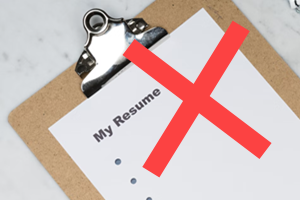How to Get A Job Workshop
For the next few weeks, we’re going to devote the Q&A feature to a workshop. Instead of Q&A, this limited series of columns will be “All Answers,” or, if you will, “How To.” So the only question we’ll be addressing in several editions of the newsletter and in this column will be about how to get a job. We’ll start with “Don’t write a resume!” I hope you find this deep dive helpful, and that you will — as always — dive into the discussion in the Comments section below! — Nick
How to Get A Job: Don’t write a resume
 The first step on your job search is to become aware of the myths of job hunting. The first myth is that your resume will get you in the door for a job interview.
The first step on your job search is to become aware of the myths of job hunting. The first myth is that your resume will get you in the door for a job interview.
It won’t. It’s a fallacy.
Don’t write a resume
Don’t write a resume to start your job search. It’s a terrible habit that will slow you down. Worse, you’ll find yourself defending your resume in job interviews when you should be tackling the job you want. A resume tells the hiring manager what you’ve done. What the manager needs to know is what you will do if you’re hired to make the business and the manager more successful. Your resume can’t do that.
Resumes have failed at getting you in the door so often that you’ve accepted it as an unavoidable trauma. All job seekers have come to accept resume failure as normal. But failure is what you choose every time you submit a resume (or the equivalent: a job application) to apply for a job interview.
Calculate the resume myth
You can prove to yourself just how costly the resume fallacy is. How many resumes have you sent out during your life? Make a reasonable estimate. Now, how many job interviews have you gotten from those resumes? Draw a ratio:
RESUMES / INTERVIEWS
I know the ratio it’s tiny. Minuscule. Practically meaningless.
Let’s go a step further: How many resumes have you submitted for every job offer you’ve gotten?
No one wants to view their future as a game of chance, but the resume ratio reveals most job seekers are desperate gamblers.
Your resume will get you rejected
Software developer Joel Spolsky created several successful software companies including StackOverflow, which gets over 100 million visitors per month. He sold the company for $1.8 billion. He built his success by avoiding the myths and hiring people who are smart and get things done. Here’s what this expert hiring manager says about Getting Your Resume Read:
“We get between 100 and 200 [resumes] per opening. There is no possible way we can interview that many people. The only hope is if we can screen people out using resumes. Don’t think of a resume as a way to get a job: think of it as a way to give some hiring manager an excuse to hit DELETE.”
Spolsky isn’t against using resumes per se, but this entrepreneur points out the dirty little secret about using a resume to get a job: It’s a myth that wastes your precious time when you need to stand out and to get an edge over hundreds or thousands of competitors for the job you want.
But it’s actually worse. The resume fallacy is a systemic problem. The employment system itself conspires to make it even harder to get an interview from your resume. As more and more job seekers learn to feed resumes into job-board databases, and as employers rely more and more on Applicant Tracking Systems (ATSes), these automated resume-scanning machines keep increasing your competition. This lowers the odds that your resume will do what HR managers claim: “The purpose of your resume is to get you in the door for an interview.”
Those HR managers are lying. As Spolsky points out, the purpose of your resume is to help employers reject you. The automated deluge of incoming resumes leaves them no choice.
What gets you in the door?
Consider this: You send your resume to five hundred companies and it sits in a manager’s file while thousands more resumes pile in after it. At some point, the manager will decide whether to interview you. Meanwhile, my candidate is sitting in the manager’s office describing how they will help the manager produce profit and contribute to the bottom line.
There’s a difference between a job hunter who uses a resume and a job hunter who cultivates and uses personal contacts to get into a company they’ve targeted. One gets the job and one doesn’t. Hiring managers rely on their trusted contacts to endorse and personally recommend good job candidates. Meanwhile, your resume is used to reject you.
(A headhunter is a special case of the personal contact that gets you in the door. But don’t count on a headhunter’s help. It’s far better to use a professional referral. 50-70% of jobs come from personal referrals. Only about 3% of jobs come from headhunters.)
So, what’s a resume for?
Should you not have a resume? Of course you should have a resume: a good, simple list of your work experience, expertise and credentials. (Believe me: Employers don’t trust resumes even as they solicit millions of them, because they know over 80% of people lie on their resumes.)
Here’s my myth-busting advice: Don’t write a resume to start your job search.
- Never hand your resume to anyone “to get in the door.”
- Never use a resume to apply for a job.
- Never use a resume “to market yourself.”
The only time you should use your resume is after you have established substantive contact with the hiring manager —
- not with a recruiter
- not with HR, and
- not with any automated applicant system.
Your resume by itself does not count as substantive contact. You have to earn substantive contact, which is usually made through a trusted referral.
What’s a resume really for? The only purpose of a resume is to fill in the blanks about who you are — after you have used better means to meet a hiring manager. If a hiring manager does not already know exactly why you are worth interviewing, your resume isn’t going to help.
To get a meaningful shot at winning the job you want, make sure the hiring manager knows all about you before they read your resume. Rely on your resume only to fill in the blanks for a hiring manager who already has adequate information to want to interview you.
Interviews and jobs don’t come from resumes
Beware the resume myth. Don’t start any job search by writing a resume that’s “a marketing piece.” Your resume doesn’t “sell you.” It is a dumb document that a manager can use to quickly reject you after spending about 6 seconds looking at it.
So don’t waste precious time on resumes when you can invest it meeting hiring managers. People don’t get jobs from resumes. They get jobs through people the manager knows and trusts.
Next
How to Get A Job: Pick only the right 3-4 companies
I invite you to post your thoughts, experiences and advice about resumes and how to get a job in the Comments section below. Related questions and suggestions for future topics in the Workshop are welcome!
: :




 Per the human-resources department and the federal government, it’s illegal to ask a job candidate their age because it may lead to discrimination. We carefully consider all candidates, no matter the year they were born, when hiring new talent. After all, age is just a number!
Per the human-resources department and the federal government, it’s illegal to ask a job candidate their age because it may lead to discrimination. We carefully consider all candidates, no matter the year they were born, when hiring new talent. After all, age is just a number!
 Twice in the last month or so I’ve gotten LinkedIn mail from recruiters who were really excited about my background and wanted to talk to me about a position that would be right up my alley. I’d reply offering a date and time to talk. Both times I was ghosted. LinkedIn’s utility for job search continues to take a nosedive. “There oughta be a law!” How can I judge what’s real and what’s spam?
Twice in the last month or so I’ve gotten LinkedIn mail from recruiters who were really excited about my background and wanted to talk to me about a position that would be right up my alley. I’d reply offering a date and time to talk. Both times I was ghosted. LinkedIn’s utility for job search continues to take a nosedive. “There oughta be a law!” How can I judge what’s real and what’s spam?